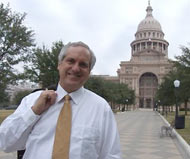8/19/2007
Texas Driver Tax Claims 1.5 Million LicensesTexas has issued 1.5 million license suspensions as a result of its driver responsibility taxes or civil remedial fees.

The primary result of the Texas Driver Responsibility Tax has been the suspension of 1.5 million driver's licenses belonging to low-income motorists unable to pay the stiff new fines. According to data obtained by the El Paso Times newspaper, the state Department of Motor Vehicles suspended 1,342,449 licenses since 2004 because motorists could not pay the extra $750 fee imposed on paperwork-related violations including driving with an expired license or without proof of insurance -- in Texas the punishment for driving with a suspended license is another license suspension. Another 183,239 motorists were unable to come up with the extra $3000 to $7500 in DUI fees. Another 16,187 were unable to pay the point tax which can run between $300 and $1200.
"Today, everyone in Austin knows that the real story behind these high fines and surcharges is not traffic safety, but money," said state Senator Eliot Shapleigh (D-El Paso). "In other words, it's a tax."
In 2003, the Texas legislature followed the lead of New Jersey and adopted the driving surcharges as a means of increasing revenue in the face of a $10 billion budget deficit. Although funds from the fees are directed toward trauma care, only about one-third of the billed amount has actually been collected because 1.5 million motorists have been unable to pay.
"The Driver Responsibility law is creating new debtor prisons," said state Senator Eliot Shapleigh. "Trauma care should be paid with taxes, not the threat of prison. We all want a safe community, but taking parents from children and employees from the workplace to put them in jail because they can't afford to pay traffic fines does not make sense."
Starting September 1, Texas will allow private debt collection companies to hound motorists for the delinquent fees in return for up to 30 percent of the fees the company is able to collect. The new law will also allow periodic amnesty and gives the DMV discretion to reduce the surcharge imposed for certain offenses or to provide more flexible installment payment plans.


